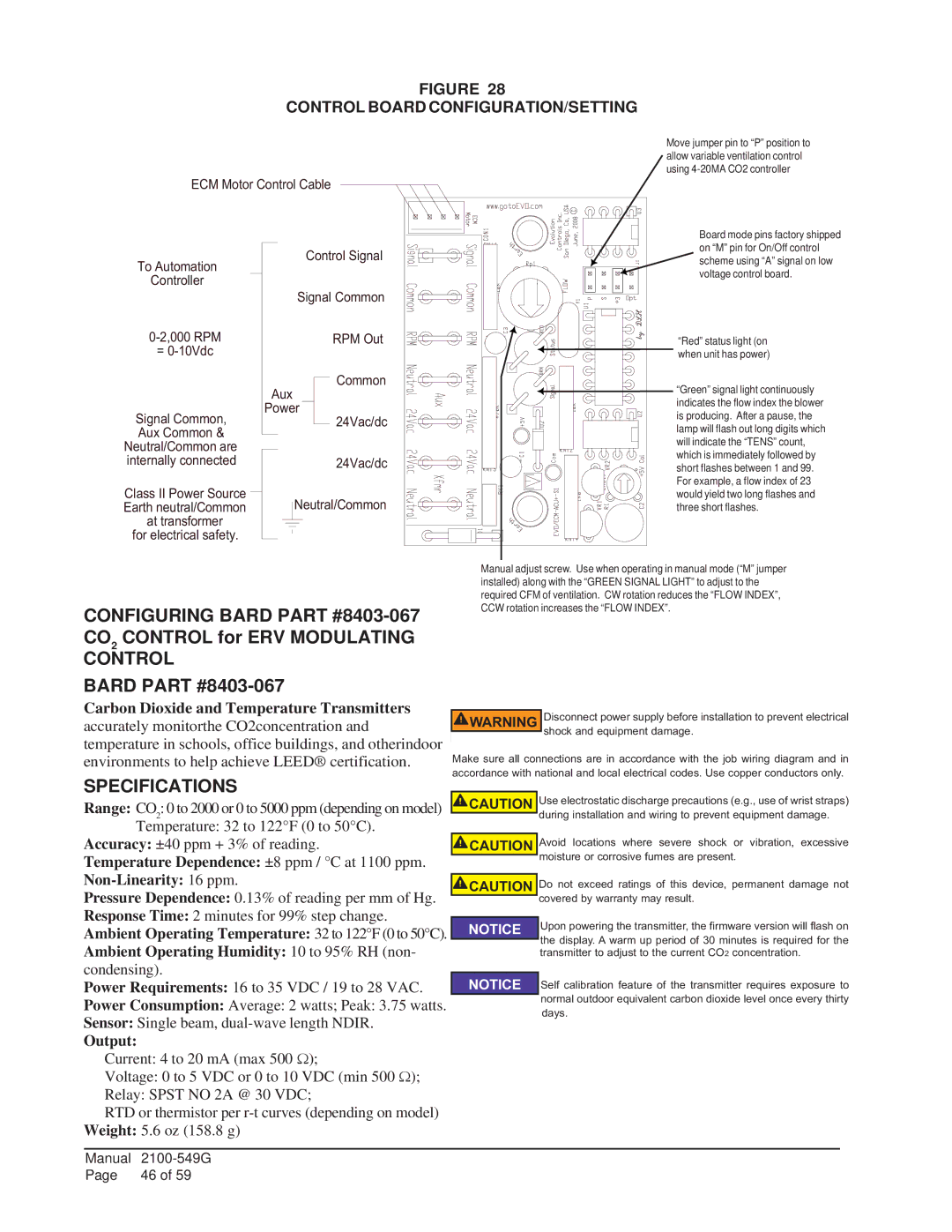
FIGURE 28
CONTROL BOARD CONFIGURATION/SETTING
ECM Motor Control Cable
Move jumper pin to “P” position to allow variable ventilation control using
To Automation
Controller
0-2,000 RPM
= 0-10Vdc
Signal Common, Aux Common & Neutral/Common are internally connected
Class II Power Source Earth neutral/Common at transformer
for electrical safety.
Control Signal
Signal Common
RPM Out
Common
Aux
Power
24Vac/dc
24Vac/dc
Neutral/Common
Board mode pins factory shipped on “M” pin for On/Off control scheme using “A” signal on low voltage control board.
“Red” status light (on when unit has power)
“Green” signal light continuously indicates the flow index the blower is producing. After a pause, the lamp will flash out long digits which will indicate the “TENS” count, which is immediately followed by short flashes between 1 and 99. For example, a flow index of 23 would yield two long flashes and three short flashes.
CONFIGURING BARD PART
BARD PART
Manual adjust screw. Use when operating in manual mode (“M” jumper installed) along with the “GREEN SIGNAL LIGHT” to adjust to the required CFM of ventilation. CW rotation reduces the “FLOW INDEX”, CCW rotation increases the “FLOW INDEX”.
Carbon Dioxide and Temperature Transmitters accurately monitorthe CO2concentration and temperature in schools, office buildings, and otherindoor environments to help achieve LEED® certification.
SPECIFICATIONS
![]() WARNING Disconnect power supply before installation to prevent electrical
WARNING Disconnect power supply before installation to prevent electrical ![]() shock and equipment damage.
shock and equipment damage.
Make sure all connections are in accordance with the job wiring diagram and in accordance with national and local electrical codes. Use copper conductors only.
Range: CO2: 0 to 2000 or 0 to 5000 ppm (depending on model) Temperature: 32 to 122°F (0 to 50°C).
Accuracy: ±40 ppm + 3% of reading.
Temperature Dependence: ±8 ppm / °C at 1100 ppm.
Pressure Dependence: 0.13% of reading per mm of Hg.
Response Time: 2 minutes for 99% step change.
![]()
![]() CAUTION
CAUTION
![]()
![]() CAUTION
CAUTION
![]()
![]() CAUTION
CAUTION
Use electrostatic discharge precautions (e.g., use of wrist straps) during installation and wiring to prevent equipment damage.
Avoid locations where severe shock or vibration, excessive moisture or corrosive fumes are present.
Do not exceed ratings of this device, permanent damage not covered by warranty may result.
Ambient Operating Temperature: 32 to 122°F (0 to 50°C).
Ambient Operating Humidity: 10 to 95% RH (non- condensing).
Power Requirements: 16 to 35 VDC / 19 to 28 VAC.
Power Consumption: Average: 2 watts; Peak: 3.75 watts.
Sensor: Single beam,
Output:
Current: 4 to 20 mA (max 500 Ω);
Voltage: 0 to 5 VDC or 0 to 10 VDC (min 500 Ω);
Relay: SPST NO 2A @ 30 VDC;
RTD or thermistor per
NOTICE | Upon powering the transmitter, the firmware version will flash on | |
the display. A warm up period of 30 minutes is required for the | ||
| ||
| transmitter to adjust to the current CO2 concentration. |
NOTICE Self calibration feature of the transmitter requires exposure to normal outdoor equivalent carbon dioxide level once every thirty days.
Manual | |
Page | 46 of 59 |
